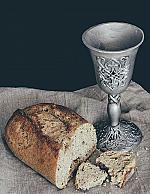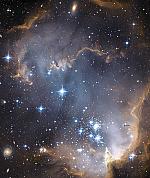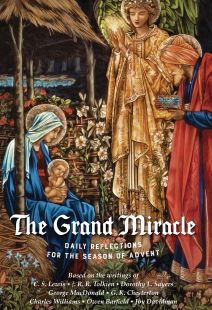Day 13. The fire of Christ within

[above: Fire, Courtesy of Pixaby]
I am the living bread that came down from heaven. Whoever eats this bread will live forever. This bread is my flesh, which I will give for the life of the world. (John 6:51, NIV)
In final participation—since the death and resurrection—the heart is fired from within by the Christ, and it is for the heart to enliven the images.
—Owen Barfield, Saving the Appearances
When I was a young Christian, I was told that there were “spiritual” things and there were “worldly” physical things, and what was physical should be set aside in favor of what was spiritual. Maybe you were told that too.
In his book Saving the Appearances, Owen Barfield—friend of C. S. Lewis, lawyer, and philosopher—tells me that I was wrong. Barfield is sometimes unorthodox, but on this particular point he is in line with Christian tradition: all of human history, stretching back into the depths of unrecorded time, is centered on the Incarnation. In this act the divine Logos that exists eternally beyond the physical world entered into it in the person of Jesus.
Only through the Incarnation, Barfield believed, could humans move from “original” to “final” participation. In original participation, which he identified with pre-Christian paganism, human beings experienced the divine presence as something outside themselves in the physical world. In the Old Testament, the ancient Hebrews rejected this concept and recognized God as a being wholly other than the physical world. But in the Incarnation, God entered not only into the physical world but into the human race in particular, so that through the Holy Spirit, people could consciously participate in the divine.
Because of this we are called to bring life to all creation; the physical world is no longer a purely material collection of “idols.” The great spiritual struggle of our times, according to Barfield, is against a worldview in which physical things are nothing more than physical and no transcendent meaning exists. But the answer is not to go back to a paganism in which humans are the playthings of spiritual forces, but to go forward to a redeemed creation in which the light of the divine Logos shines through human minds and hearts into the world of nature and the artifacts of human ingenuity.
And this night, with this tiny baby in a manger, is the moment when everything changes.
PRAYER: Lord, help us in the power of your Spirit to go forward into your redeemed creation, fired by your love. Amen.
By Edwin Woodruff Tait
[Christian History originally published this article in Christian History Issue #133+ in 2019]
Edwin Woodruff Tait is contributing editor at Christian History.Next articles
Day 14. More of God and less of me
We fix our gaze on the crown more than on the King
David C. DowningDay 15. Enjoy God forever
The joy that surprises us is that of actually finding what we long for.
George MarsdenDay 16. The holy one
Charles Williams often depicted the fear of his fictional characters when they encountered the transcendent.
Marjorie Lamp MeadDay 17. Blessing Our Complicated Life
In Jesus, God entered the community of creation so that creation could enter the community of God.
Emily Ralph Servant







